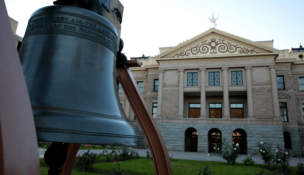Brewer must balance faith, business interests in deciding fate of SB1062
Howard Fischer, Capitol Media Services//February 25, 2014//[read_meter]
Brewer must balance faith, business interests in deciding fate of SB1062
Howard Fischer, Capitol Media Services//February 25, 2014//[read_meter]
Arizona Gov. Jan Brewer (Photo by Ryan Cook/RJ Cook Photography) The fervent opposition of the business community and Gov. Jan Brewer’s desire to create a legacy...

















